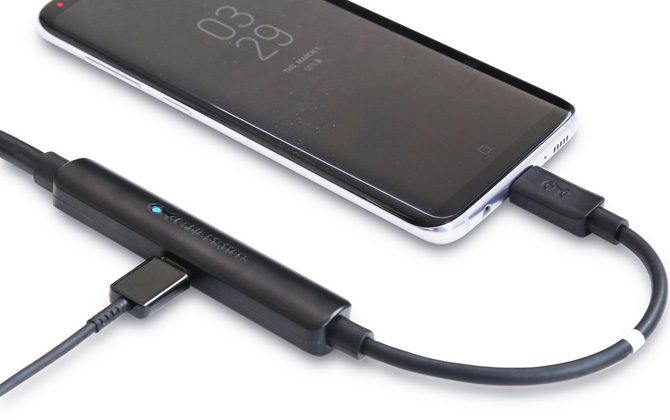Sometimes, your phone's screen just isn't big enough for viewing your photos and videos or playing games. Connecting your phone to your TV can be a quick and easy fix. I tested a number of solutions using phones from Apple, LG, Samsung, and Google, as well as TVs from Samsung and LG and various streaming devices. Here are the methods that work best for every combination of models.
How to connect your iPhone to your TV
The easiest way to connect your iPhone to your TV is to do it wirelessly. To do that, you'll need a TV that supports the most recent version of AirPlay, AirPlay 2. Most TV manufacturers started building AirPlay 2 into their products in 2018 or 2019. You can check for your model on Apple's list of AirPlay 2-enabled TVs and streaming devices.
To use AirPlay:
- Make sure your iPhone and TV are connected to the same WiFi network
- Open the Control Center. (For iPhone X or later, swipe down from the upper-right corner. For iPhone 8 or earlier, swipe up from the bottom edge of the screen.)
- Select Screen Mirroring (the two rectangles)
- Select your TV from the AirPlay devices available on your WiFi network
If you have an older TV that doesn't support AirPlay or need to plug your iPhone directly into a TV, you can purchase a Lightning to HDMI adapter. Once you connect your iPhone using the adapter to your TV’s HDMI port, you'll be able to see whatever is on your iPhone's screen on your TV. Some apps will only display vertically. However, apps like Netflix support screen rotation so you can fill the screen.
I've been using and recommend Apple's Lightning to HDMI adapter, which has a power passthrough port to keep your iPhone charged. You'll find it for under $50 on Amazon.
How to connect your Android phone to your TV
How you connect your Android phone to your TV depends both on what brand of phone and TV you own. Android phones can connect wirelessly to recent-model TVs if they are on the same WiFi network and support the same WiFi-based standards. Here's how it works for the most popular brands:
- Samsung TVs – Use the Screen Mirroring setting on your TV and the SmartThings app on your phone to cast photos and videos. If you want to mirror your display to see other apps, go into Settings on your phone and find the screen sharing feature, which may be called "cast,” "Smart View," or "mirroring," find your TV and connect.
- TCL TVs – Use the Roku app for Roku TV models or Google Home app for Android TV models to cast phots and video. If you want to mirror your display to see other apps, go into Settings on your phone and find the screen sharing feature, which may be called "cast,” "Smart View," or "mirroring," find your TV and connect. For Android TV models, you’ll be limited to apps that support Chromecast.
- LG TVs – Go to Settings > Share and Connect > Screen Sharing or Mirror Screen and then on your phone, go into Settings on your phone and find the screen sharing feature, which may be called "cast,” "Smart View," or "mirroring," find your TV and connect
- Vizio TVs – Use the Roku app for Roku TV models and the Google Home app for models with SmartCast OS to view photos and videos. If you want to mirror your display to see other apps, go into Settings on your phone and find the screen sharing feature, which may be called "cast,” "Smart View," or "mirroring," find your TV and connect. For Android TV models, you’ll be limited to apps that support Chromecast.
- Sony TVs – Use the Google Home app for Android TV and Google TV models to cast photos and videos. You can also cast from apps that support Chromecast by going into Settings on your phone and finding the screen sharing feature, which may be called "cast,” "Smart View," or "mirroring," find your TV and connect.
You may also be able to connect your Android phone to your TV with an HDMI cable. Most recent-model Android phones have USB-C ports, and some (but not all) of these phones' USB-C ports support HDMI out. Called “HDMI Alt mode”, you'll find this feature on select models (usually the higher-end models) from some manufacturers. For instance, most recent Samsung Galaxy S and Note phones support HDMI out (starting with the S8 and Note 8) as well as recent LG V and G series (starting with the V20 and G7), OnePlus phones (beginning with the 7), and recent Sony Xperia phones (starting with the Xperia 1). Check with your phone manufacturer to see if your smartphone supports HDMI output.

For HDMI cables for your phone, I recommend the Cable Matters USB-C to HDMI adapter with power passthrough and the Cable Matters USB-C to HDMI cable with power passthrough – both are under $25 on Amazon and receive more than four stars from consumers.
Tip: If the picture looks low resolution when you plug in, try another HDMI port. For example, when I connected my Samsung Galaxy S21 to my Samsung TV, I found there was poor resolution when connected through the HDMI port labeled MHL, but the picture on other HDMI ports looked fine. If your phone has a desktop mode, like Samsung DeX, you'll want to make sure you've selected screen mirroring instead of the desktop mode. For Samsung phones, you'll find this under Settings > Connections > More connection settings > HDMI mode.
If you have an older model TV that doesn’t support the methods above, I recommend using a Roku streaming device, which start at under $30 on Amazon.
[Image credit: phone connected to TV concept via BigStockPhoto, Cable Matters]
For the past 20+ years, Techlicious founder Suzanne Kantra has been exploring and writing about the world’s most exciting and important science and technology issues. Prior to Techlicious, Suzanne was the Technology Editor for Martha Stewart Living Omnimedia and the Senior Technology Editor for Popular Science. Suzanne has been featured on CNN, CBS, and NBC.

















